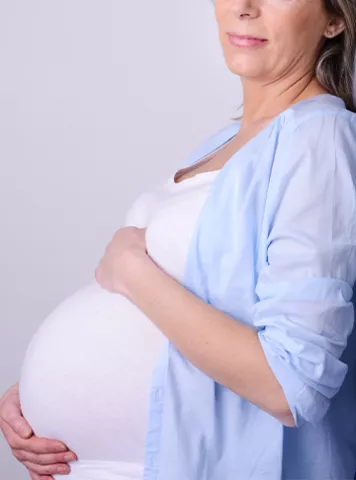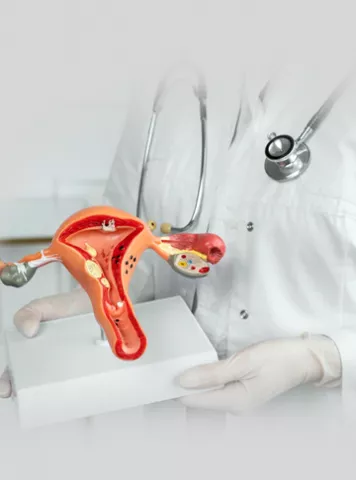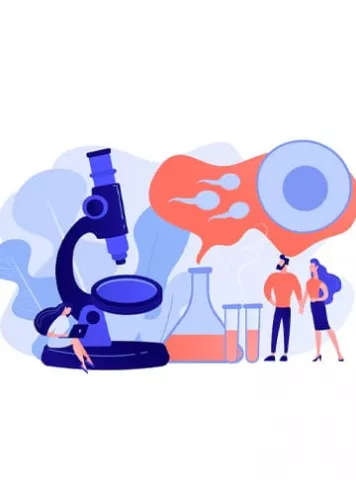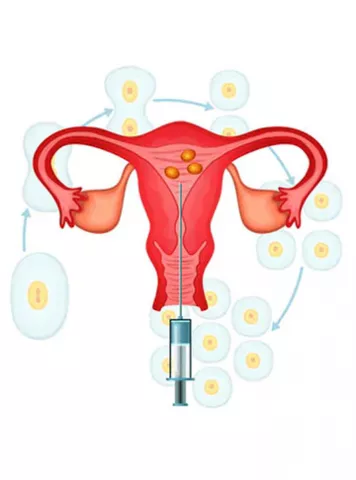Synopsis
The first choice of infertility treatments by IVF specialists is IUI or intrauterine insemination. It is an affordable and less invasive process. However, many women fail to conceive after the first IUI cycle, and they are advised to repeat the cycle. However, if a woman does not conceive after repeated IUI cycles, infertility specialists recommend IVF after a failed IUI. In this article, we will talk about IUI, its success rate, IVF, when to consider it, and its success rate.
What is IUI (Intrauterine Insemination)?
IUI, or intrauterine insemination, is a fertility treatment in which sperm are placed inside the woman’s womb using a thin catheter to achieve pregnancy. It is the choice of treatment for couples who fail to conceive naturally. It is a cost-effective fertility treatment.
When is IUI Chosen?
IUI is suggested for couples who fail to conceive through natural methods. It is a method of choice in the following cases:
- Ovulation dysfunction
- Unexplained infertility
- Low sperm count or sperm motility in men
- Endometriosis
- Cervical factor infertility
The fertility doctor may also recommend this treatment when timely intercourse, natural methods, and fertility drugs fail to help you get pregnant. Sperms are introduced inside the woman’s womb. Fertilisation occurs when the sperm penetrates the egg and merges with the cell membrane of the egg. However, pregnancy is not always achieved in the first attempt. Many women may suffer several failed IUI attempts before becoming pregnant.
What is the Success Rate of IUI?
IUI is a successful infertility treatment option for many couples, but the success rate of IUI depends on different factors. Factors that determine the success rate of IUI include:
- The overall health of the patient
- Age of both partners
- Fertility status of both partners
Thus, you must consult with a fertility expert to determine the right choice of fertility treatment for you.
What is IVF (In Vitro Fertilisation)?
IVF or In Vitro Fertilisation is a fertility treatment in which matured eggs are removed from the ovaries of a woman and fertilised with sperm in a laboratory under controlled environmental conditions. The resulting embryo is then placed inside the woman’s womb. It is an excellent fertility treatment for couples who are unable to conceive using traditional methods. This method brings a ray of hope for infertile couples who fail to achieve pregnancy after trying other methods of conception.
It is a long and expensive process as it involves different steps. Different steps involved in one IVF cycle include:
- Fertility tests of male and female partner
- Ovarian stimulation
- Retrieval of eggs
- Collection of sperms
- Fertilisation of an egg and sperm in a lab
- Transfer of an embryo in the mother’s womb Pregnancy test
When to Choose IVF?
IVF is a fertility treatment for couples who fail to achieve pregnancy even after unprotected sex after trying for one year. IVF after a failed IUI also helps couples enjoy parenthood. It is also a choice when other medical problems make it impossible to conceive through natural methods. Some reasons to choose IVF include:
- Disorders in ovulation
- Obstruction of fallopian tubes
- Polycystic ovarian syndrome (PCOS)
- Pelvic inflammatory disease
- Hormonal imbalances
- Low sperm count in men
- Immotile or malformed sperms
- Unexplained infertility in men and women
- Higher risk of genetic disorders
- An infertility specialist will recommend IVF after diagnosing the cause of infertility, medical problems, and history of fertility treatments.
Success Factors in IVF
IVF is a complex procedure that involves different steps. Proper timing and accuracy play an important role in IVF success after IUI. Factors that affect the success of IVF include the following:
-
Age
Age plays a vital role in IVF success. Women between 25-35 years have a high success rate because women have high fertility during this age. As a woman reaches the age of 40, fertility decreases, and chances of IVF success also drop. But women of every reproductive age can choose IVF because success also depends on individual health.
-
Cause of Infertility
Certain causes of infertility reduce the chances of IVF success. Women with uterine problems, uterine fibroids, and ovarian dysfunction may have lesser chances of success with IVF.
-
Previous Pregnancy
If a woman had a successful pregnancy in the part, chances of IVF success increase. IVF success rates after failed IUI decrease. IVF after IUI may be successful further, depending on different factors. Multiple miscarriages and other fertility problems can reduce the chances of IVF success.
-
Quality of Eggs and Embryo
Many factors determine the quality of eggs and embryos. Factors that affect the quality of eggs and embryos include age, ovarian reserve, sperm quality, and stimulation protocol. High-quality eggs and sperm have a better success rate.
-
Donor Eggs
If the quality of eggs is compromised due to age or other factors, then the fertility specialist may consider using donor eggs for better chances of IVF success.
-
Sperm Quality
In most cases, failure occurs due to poor quality of eggs, but in some cases, poor sperm quality is also responsible for the failure. Thus, poor quality of sperm can hinder IVF success at the first chance.
-
Controlled Ovarian Stimulation Plan
It includes the schedule and type of fertility medications administered. Accuracy of timing and doses plays an important role, and it varies from patient to patient.
-
Transfer of Embryo
It is the most important step. Healthy embryos increase the chances of success. Successful implantation is also essential in achieving success. Any flaw with time and implantation can hinder success.
-
Receptivity of Embryo to the Uterine Wall
The receptivity of the embryo to the uterine wall also plays an important role. Receptivity depends on different factors, such as the uterine wall's thickness, womb shape, and immunological factors.
-
Lifestyle
The success of IVF also depends on your lifestyle. A healthy lifestyle will make a suitable environment for the embryo. Women should not drink alcohol or smoke if they choose IVF treatment. Maintaining a healthy weight is also important to improve IVF's success. Thus, you can control your lifestyle to achieve a successful pregnancy through IVF.
IVF Success Rates
The success rate of IVF may vary from person to person. Many factors may affect IVF success rates. Success depends on both partners' health, ages, and fertility status.
It also depends on if pregnancy is stimulated using donor sperm or eggs.
It also depends on the age of the woman. Women younger than 35 can have higher chances of success than women older than 35.
IVF Success Rates After Failed IUI
Couples who fail to achieve pregnancy through IUI can choose IVF. IVF success rates after a failed IUI procedure are higher.
IVF is a better method of fertility treatment for many couples. In this process, healthy sperm and eggs are chosen for fertilisation, which also occurs in a lab under controlled conditions.
Even women above 35 can try this method if they can produce healthy eggs.
Conclusion
IVF is an assisted reproductive technology that helps many couples to enjoy parenthood. You should consult with a IVF specialist to choose the best method of fertility treatment. Your doctor can discuss different factors with you and can suggest the best fertility treatment as per your needs.
Common Questions Asked
How long does the IUI procedure take?
The IUI procedure is relatively quick. A semen sample is typically collected on the hospital premises and takes about an hour to process. Once the sample is ready, the insemination process itself takes only 5-10 minutes.
How many times can I try IVF?
The number of IVF attempts depends on various factors, including age, clinical profile, previous responses, and financial situation. If favourable conditions are met—such as being under 35 years of age, having a good response to IVF, and being able to manage the financial costs—you may consider trying IVF 3-4 times.
Are there any side effects of IVF?
During egg retrieval, a minimally invasive process produces no harmful effects. Drugs and injections administered for egg development may produce minimum or no side effects because these drugs are excreted through urine and stool. OHSS may occur in 1-2 % of patients and can be managed easily.
Is there a risk of birth defects through IVF?
IVF is a popular assistive reproductive technique used throughout the globe. Millions of babies are born to date through this technique, and no such reports are seen of increased risk of birth defects through IVF. The doctors carry out proper screening and tests to avoid any such defects.
Articles
2022


Guide to infertility treatments IUI
IUI उपचार की सफलता दर को बढ़ाने के 7 असरदार उपाय
अंतर्गर्भाशयी गर्भाधान अथवा ...
2022


Guide to infertility treatments IUI
Best Time for IUI: When is the Best Time to Do IUI?
Intrauterine insemination (IUI), in simple terms, is a simple procedure that i...
2022


Guide to infertility treatments IUI
IUI for Male Factor Infertility
IUI for Male Infertility Treatment Intrauterine Insemination (IUI) process ...
2022


Guide to infertility treatments IUI
Intrauterine insemination at 40
Infertility is relatively common these days, however fortunately there are tre...
2022


Guide to infertility treatments IUI
Is Intrauterine Insemination (IUI) safe?
Is IUI Safe? The answer to this question is, ‘Yes, IUI is safe procedure....
2022


Guide to infertility treatments IUI
Things to know before your first IUI
FOR MEN Men just need to contribute in the treatment with their sperm, whic...
2022


Guide to infertility treatments IUI
Success Rate of IUI Treatment – What to expect after IUI
What is IUI? IUI, a kind of artificial insemination, is a reproductive proc...
2022


Guide to infertility treatments IUI
Advantages and Disadvantages of IUI
Intrauterine Insemination or IUI is one of the first types of fertility interv...
2022


Guide to infertility treatments IUI
What is difference between IUI ,IVF, ICSI ?
Infertility is defined as failure to conceive even after 1 year of unprotected...
Pregnancy Calculator Tools for Confident and Stress-Free Pregnancy Planning
Get quick understanding of your fertility cycle and accordingly make a schedule to track it













